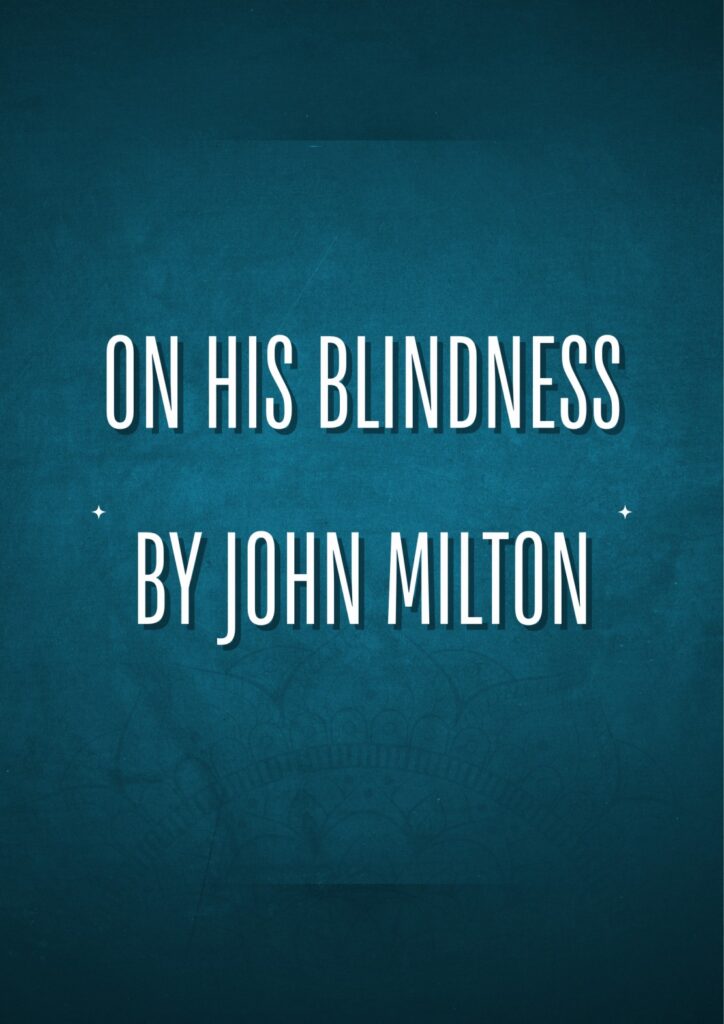Explore the summary and deep meaning of On His Blindness by John Milton. Understand how the poet grapples with loss of sight, faith, and purpose in this timeless sonnet.
On His Blindness Line by Line Explanation By John Milton

BUY JOHN MILTON’S FAMOUS BOOK ON AMAZON
Summary of On His Blindness By John Milton
Author Introduction – John Milton
John Milton was a renowned English poet, writer and thinker of the 17th century. He was born in London in 1608. He is world famous for his great poetic work “Paradise Lost”. Milton’s poems reflect religious faith, philosophy, personal struggle and devotion to God.
“On His Blindness” is one of his famous sonnets (14-line poem), which he wrote after his blindness. This poem reflects a spiritual struggle and a search for divine balance.
Background of the poem
When Milton was about 44 years old, he lost his vision completely. He was a highly intelligent and educated person who wanted to serve society through literature and religious writings.
When he became blind, he started worrying about how he would be able to use the gift of writing given by God. This poem is the result of that inner worry and introspection.
Central Theme
Service to the soul and faith in God despite physical limitations.
Balance between man’s helplessness and God’s mercy.
Loyalty, devotion and dedication to God is true service.
Patience and waiting are as valuable as hard work.
Detailed Stanza-wise Explanation of the poem
1–2 lines: Beginning of introspection
“When I consider how my light is spent
Ere half my days, in this dark world and wide,”
When I consider how my “light” (sight) has ended, and not even half of my life has passed, but this world has become a dark place for me now.
➡️ These lines depict the inner pain of Milton which he feels due to being blind. He is feeling his incompleteness.
3–6 lines: Talent and Anxiety
“And that one Talent which is death to hide
Lodged with me useless, though my Soul more bent
To serve therewith my Maker, and present
My true account, lest He returning chide;”
I miss that one Talent (writing and poetry), which is a crime to keep hidden. That Talent now lies useless within me, while my soul wants to serve God with it. I fear that when God returns, he will be angry with me that I did not use the gift given by him.
➡️ Here ‘Talent’ means in the biblical perspective, which is a gift given by God. The poet feels that if he is not able to write now, then God will ask him what did he do with his gift?
7–8 lines: Entry of Question and Patience
“Doth God exact day-labour, light denied?”
I fondly ask. But Patience to prevent
Does God expect work even from a blind man? I ask this question to myself. But before I complain, ‘Patience’ comes into my consciousness and stops me.
➡️ Milton’s soliloquy now divides into two parts – one is the questioner and the other is the answerer. This is a kind of mental conversation, where he communicates between his emotion and conscience.
9–12 lines: Patience answers
“That murmur, soon replies, ‘God doth not need
Either man’s work or his own gifts; who best
Bear his mild yoke, they serve him best. His state
Is kingly: thousands at His bidding speed”
‘Patience’ answers – God does not need any person’s work or gifts. The one who humbly accepts God’s will is the true servant. God’s kingdom is like a king, where thousands of people work at his command.
➡️ This answer shows God’s greatness and grace. The measure of service in God’s eyes is not mere action, but dedication.
13–14 lines: The real meaning of service
“And post o’er land and ocean without rest:
They also serve who only stand and wait.”
God’s servants keep doing his work on land and sea without stopping. But they also serve Him who just stand quietly and wait.
➡️ The last sentence of the poem is the most impactful. Milton teaches us that even seemingly passive waiting is a form of great service, if done with faith in God’s will.
Emotional and Spiritual Message
This poem brings out the truth of life, where a person realizes his limitations and yet maintains faith in God.
Milton teaches that every person has his own role – some serve by working, some by waiting quietly.
Our faith, patience and loyalty can be more valuable than work.
Important Line
“They also serve who only stand and wait.”
“They also serve God who just stand and wait.”
This line tells us that true service is not done only by external actions, but also by preparation, dedication and quiet acceptance of the soul.
Conclusion
“On His Blindness” is a poem of self-realization that shows that human limitations are not a hindrance to God’s vision. God does not need our hard work, but our dedication, patience and faith.
Instead of cursing his blindness, John Milton accepts it from a new perspective and teaches us that peace, waiting and surrender are also a part of devotion to God.
Recommended Reading
The Hour of Truth By Pervical Wilde